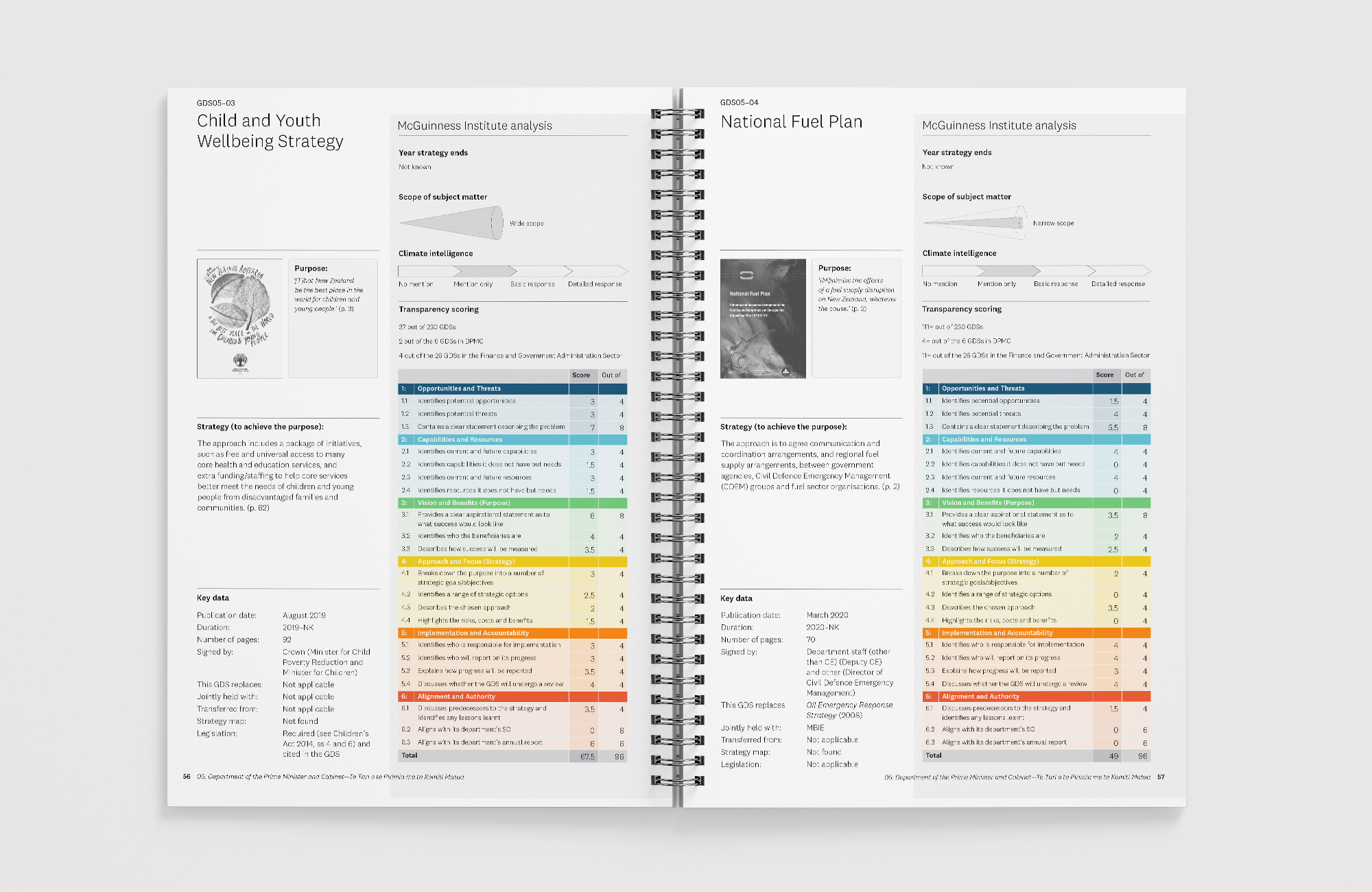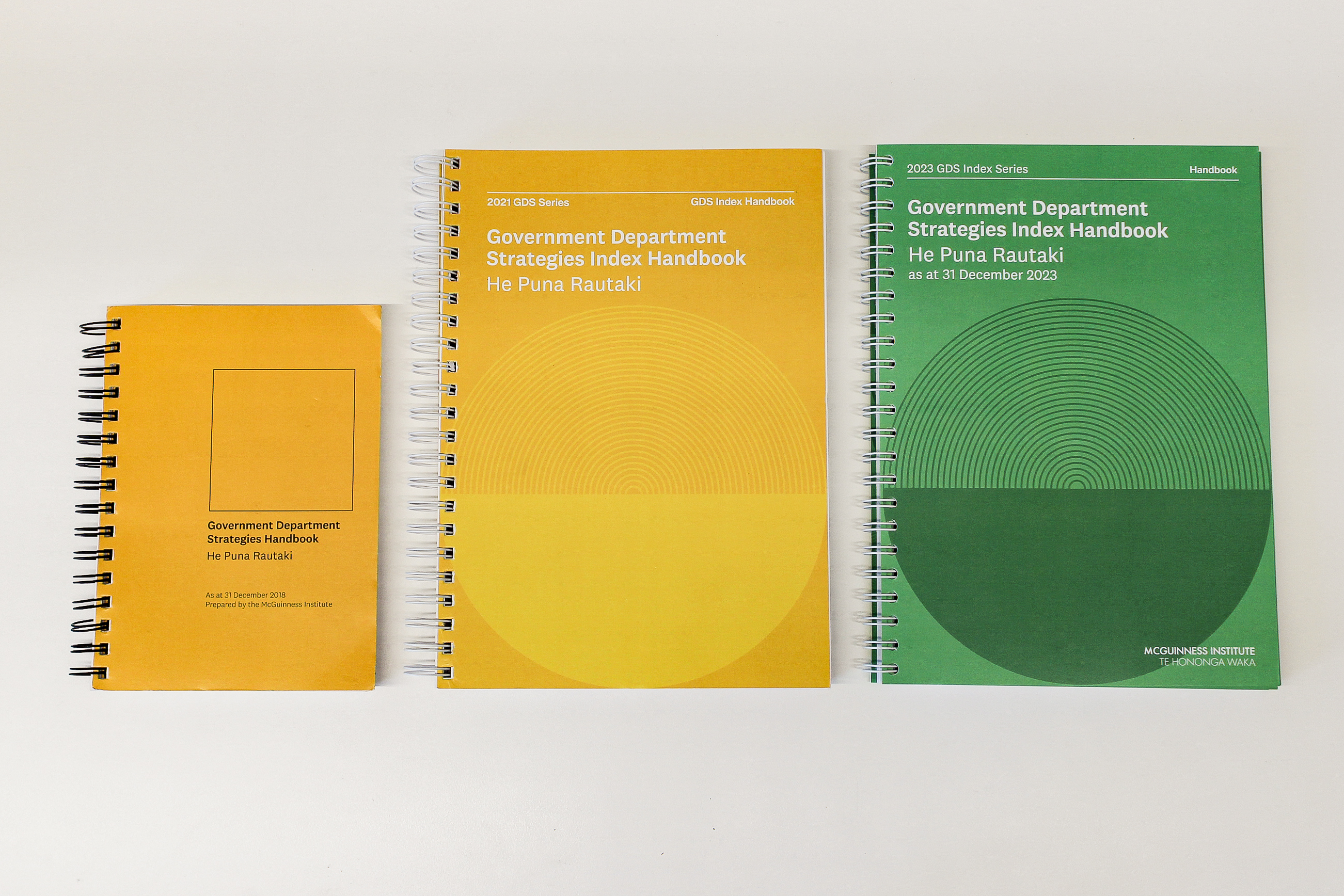
We’ve got no money, so we’ve got to think.
– New Zealand physicist, Ernest Rutherford
As we close for 2024, we are excited to share the Institute’s fourth and latest GDS Index.
What is the GDS Index?
The Institute’s GDS Index aims to illustrate how New Zealand might strengthen government department strategies (GDSs) to be more effective, responsive, measurable, comparable and durable through public consultation, engagement and ownership.
More information and past versions of this document are available on our website.
Why do we produce the GDS Index?
Our GDS project is important because if government departments make the content of GDSs more useful, these strategies’ users will be better able to assess their quality and, where appropriate, work with government to deliver better outcomes more cost-effectively.
Better visibility and stewardship of the GDSs would not only deliver an integrated and aligned approach to government activity; it would reduce the risk of strategies working against each other. Further, it is all too easy to initiate a strategy and then quietly let it be replaced or lost into history without lessons being learned. It is critically important to monitor GDSs to the end of their useful life.
GDSs provide citizens with windows into the workings of government and act as critical instruments for policymakers in bringing about change. Hence, GDSs help build trust in government activities through transparency, accountability and public engagement.
The Institute has continually raised concerns over the government’s inability to identify, execute and review these key strategic documents. They are expensive instruments to create, and costly to replace. They deserve our attention.
How do we produce each GDS Index?
To understand how each Index is developed, you can find these documents on our website:
- Methodology – why the Institute publishes a GDS Index and how, in detail, the indexes are created.
- Complete lists of GDSs – GDSs listed according to what key information that they contain.
- Scoring – detailed scoring and ranking for each GDS.
- Analysis – key observations from the Institute’s most recent analysis of GDSs.
- Best practice – a guidance document for policy analysts when preparing strategy documents.
- Strategy maps – a catalogue of all strategy maps the Institute has identified within GDS documents.
- Analysis of climate change – explicit and implicit mentions of climate change within GDS documents (updated in the 2023 GDS Index to analyse considerations of climate impacts more deeply).
- Analysis of poverty – explicit and implicit mentions of poverty within GDS documents.



Diagram from p. 8 of the 2023 GDS Index Handbook

What did we learn from the 2023 GDS Index?
The Institute was pleased to see an increase in strategy maps and an increase in climate reporting. Such observations will be the subject of a think piece which the Institute hopes to produce early next year.
In the latest GDS Handbook, we have presented four major recommendations:
- The House of Representatives should find a better way to communicate and report on government priorities, goals and targets.
The House should agree to establish a consistent place where citizens can find a list of government priorities. Although priorities, goals and targets are often mentioned in the Budget speech or in the press, the reality is that they are not always easy to find, review or compare across governments.
- The Ministry for Regulation Te Manatū Waeture and/or Te Kawa Mataaho Public Service Commission should maintain a central register of GDSs, along with a consultation timeline for members of the public and guidance on how government departments can improve GDS content.
As GDSs are designed to address significant issues of their day, we believe there is considerable historical value in learning lessons from past strategies. However, this information is often lost in the current system because non-operational GDSs are removed from websites and there is no central register.
- The Minister of Climate Change should require all 230 GDSs to be reassessed to take into account the impacts of climate change, before 1 July 2025.
In this Index, we have included a special focus on climate change. See Working Paper 2024/09: Analysis of Climate Change in Government Department Strategies as at 31 December 2023.
- Government departments should identify the GDSs they have in operation in their annual reports.
Identification of GDSs in operation in a department’s annual report would provide an added measure of transparency and accountability. This would also bring clarity to how GDSs are being implemented.
If you are interested in learning more, please read Working Paper 2024/08: Methodology for the 2023 Government Department Strategies Index, which is on our website, titled GDS Index. The methodology explains how and why this research was undertaken, while the Handbook explains what we found.
Please note that, due to the immense amount of work involved in producing our second edition of COVID-19 Nation Dates, our latest GDS Index was late to publication (it currently goes to 31 December 2023). In early 2025, we will update it to include GDS documents produced up to 31 December 2024.
It is now ten years since we started this project, and in all honesty, I cannot believe New Zealand is still failing to provide the necessary stewardship and oversight of these important public policy instruments. Given our concerns over these shortcomings, the Institute is now committed to preparing an annual list of government strategies from 2025. However, our hope is that government will undertake this work as expressed in the recommendations above.
Thank you to government department officials for their assistance, patience, and interest in our work. We hope that we have honoured the hard work of those writing strategy documents in government, and that this Handbook helps to continue the conversation around GDSs and their capacity to drive change.
The 2023 GDS Index is available in soft copy here. If you would like to order a hard copy, please purchase from our online shop or get in touch at enquiries@mcguinnessinstitute.org.
